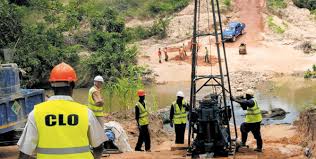Base Titanium Adopts Best Mining Practices
Posted on : Saturday , 18th July 2015

Kenya is about to enter an important new stage in the development of its mining sector. The Mining Bill 2014, currently under review by the Senate, should be enacted before the end of the year and Kenya is about to embark on developing a 20-year strategic plan for the sector with the assistance of McKinsey & Company.
The Mining Bill will regulate, amongst other things, how investors engage with various levels of government and local communities. As much as possible, it is hoped that the bill will adopt international guidelines on best practice for the industry applied by mining companies and international financial institutions in the governance of the sector.
The purpose of these guidelines is to protect the interests and rights of people affected by a mining project, including the rights of landowners and neighbouring communities as well as the rights of employees. They also cover areas such as environmental management and protection, transparency of financial payments, security and occupational health and safety.
Base Titanium, synonymous with Kenya's largest mining development, the Kwale Mineral Sands Project, has developed, constructed and now operates the Kwale Mine under a suite of international guidelines complementing Kenyan legislation.
Central to this are the International Finance Corporation Performance Standards on Social and Environmental Sustainability, the Equator Principles, the IFC and World Bank Group Environmental Health and Safety Guidelines, the International Labour Organization standards and the Voluntary Principles on Security and Human Rights.
In addition, Base is one of only 91 extractive companies globally that are voluntary corporate members of the Extractive Industries Transparency Initiative, ensuring that all financial payments to government are publically disclosed and published annually.
We strongly encourage Kenya to take the necessary steps to becoming an EITI member country in order to create an environment of transparency and accountability.
We are absolutely committed to conducting our business in a legal, honest and ethical manner and consider this critical to achieving our long-term goals. We do not accept or tolerate any behaviour that is inconsistent with this commitment. We recognise that perception of integrity is as important as the fact.
It may well be asked, why would a company adopt standards that go above and beyond those required by local regulations? For Base, these international standards have been adopted because we believe in these principles and want to ensure that the rights of our employees, local and project-affected communities and the environment are protected and enhanced. Put simply, we believe that adopting best practices in relation to such matters as ethics, environmental management and health and safety contribute to our success.
Base believes that in order to be a successful mining company, there must be a flow of mutual benefits between the mine and the community. For Base, this means having a local community that provides motivated staff with pride in their work, security of property and personnel, and that will provide a positive reference for future investment elsewhere in Kenya. In return, the local community receives employment, training, skills transfer, business opportunities and investment in socioeconomic development in the knowledge that their rights and interests are promoted and protected.
Adhering to international guidelines is one part of Base's commitment to the flow of mutual benefits. Another significant commitment made to the community is through the Community Development Management Plan. In close collaboration with local communities, key areas have been identified for investment in a range of programmes, including provision of social infrastructure, supporting livelihood enhancement projects, improving community health and educational opportunities.
To date, more than 100 individual projects have been completed at an investment of over half a billion shillings. These have included building schools and medical facilities, sinking boreholes, running agricultural programmes, providing scholarships and school sports programmes and community group training.
Investment in the community, as guided by the CDMP, is a central component of our business philosophy and aligning it with the Kwale County Integrated Development Plan, it is also a key contributor to the county's growth and development.
The transfer of skills to Kenyan employees and community members is a further component of the flow of mutual benefits. Base has partnered with the Technical University of Mombasa to deliver the practical component of its apprenticeship programmes. We have also had our graduate and intern programmes accredited by the National Institute Training Authority and recognised as a model for youth development. In addition, we provide training opportunities to local residents in order to transfer skills to the wider community.
Through the Kwale project, Base is recognised internationally as the developer and operator of a highly successful mining operation.
While return on investment for shareholders remains paramount, being a responsible and active development partner is equally important. Whether we have managed to transform the lives of our closest stakeholders and, through adopting and introducing international best practices, we have contributed to building a vibrant mining sector in Kenya that sees benefits flow through to all levels of Kenyan society will be important measures of our success. It is our objective to provide a blueprint for the way future mining projects in Kenya are implemented.
If Base is successful in achieving this, it places us in a unique position to work collaboratively with the government to promote Kenya as an attractive mining jurisdiction and destination for foreign investment.


